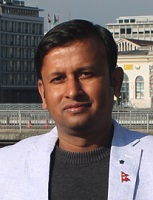PRASAD, A/Prof Pramendra
Nepal – Chair WONCA Working Party on e-Health

What work do you do currently?
I am working as an Associate Professor at Department of General Practice and Emergency Medicine in the B. P. Koirala Institute of Health Sciences (BPKIHS) which is located in Eastern Part of Nepal. My job includes patient consultations and education, acute and emergency care provision, teaching-learning activities of undergraduates and post graduate students, research and mentorship. I am also the Medical Coordinator of the eHealth and Telemedicine Program which is part of the BPKIHS-HUG-RAFT Network.
What other interesting activities that you have been involved in?
I am trying to decrease health disparities, and training people who not only provide healthcare but also address the social determinants of health and vulnerability, and advocate for the communities they serve.
I am Honorary Secretary of the WONCA South Asia region executive committee and am also involved as an executive member of the WONCA Working Party on Mental Health and WONCA Special Interest Group on Emergency Medicine.
I am the Associate Editor of the Journal of Diabetes and Endocrine Association of Nepal as well as an editorial member of the Journal of General Practitioners and Emergency Medicine Association of Nepal.
I am on the Executive Board of Koshish Foundation which is non-profitable foundation which works in community for health promotion and education in the form of health camps in most of the rural areas of most of the eastern part of the country, and health education and promotion for school and college students - such as training in first aid, health hygiene.
What are your hopes as chair of the Working Party (WP) on e-Health?
As chair, my hopes are to make people understand more about what eHealth and digital health is and how we can implement it in improving healthcare.
A digital revolution could support more integrated services, better safety, improved quality and access to care everywhere, promote health solutions and strengthen relationships with health carers.
The eHealth terminology refers to the use of information and communication technologies for healthcare systems aimed at increasing their efficiency, improving quality of life and unlocking innovation in the sector.
Digital applications might cover an extensive range of services, from electronic health records, wearable solutions, ePrescriptions and even clinical decision-support systems. These are only a few examples of the solutions that a connected continuum of care can provide. I believe this will allow healthcare settings to have a real chance at improving patients’ quality of care, tailor healthcare to the needs of the individual and ensure that patients have the right to be involved in making decisions which directly impact their lives.
If policy-makers play their cards right, eHealth solutions can make a real difference in patients’ experiences and ensure their safety.
The digitalization of the healthcare sector still has a long way to go. Although over 60 per cent of global citizens agree that patients should be able to manage their own data and that sharing health data can be beneficial. However wearable health tools are not commonly used, prescriptions are often not digital, and healthcare professionals continue to work with ageing IT systems that cannot exchange information effectively. Healthcare needs new heroes – innovators. Before technology makes a transformation, we need a transformation in healthcare culture.
It is also possible that in the upcoming years technologies will grow gradually, naturally adapting to everyday life, in an evolutionary, not a revolutionary manner, without disruptive changes. All in all, there may be different scenarios of digital transformation.
I hope that my role as chair of WP e-Health will foster other members in primary health care to adapt different eHealth/ digital health tools to improve primary health care especially in resource-poor countries. One way to achieve this is provision of workshops on eHealth and research. I would like to provide opportunities for our diverse WP members to be actively engaged in achieving our goal.
What are your interests as a doctor and also outside work?
I like to create safe learning environments that can engage newer generations of residents to be an excellent and quality driven general practitioners and can also to become effective leaders of the healthcare team. I love learning and creating innovative ways of teaching and providing primary care and improving population health.
I love traveling and public speaking. WONCA activities have opened the doors to meeting family doctors from around the world and provide me the opportunity to learn and share the present about healthcare globally.
I play cricket and football and love cooking, dancing, and dining out with my wife (a physiologist working in same hospital where I do), my daughter, friends and family.